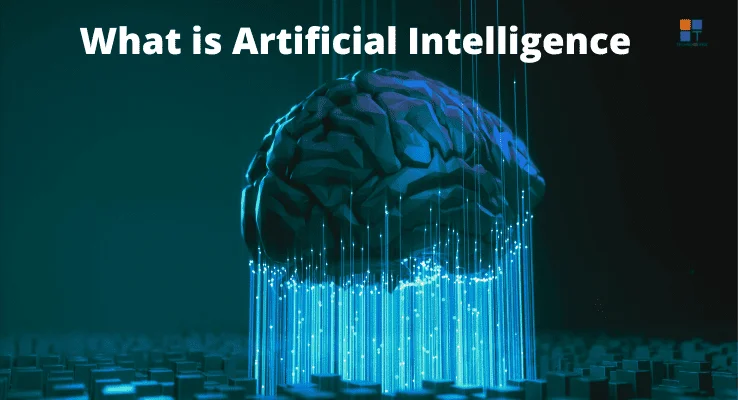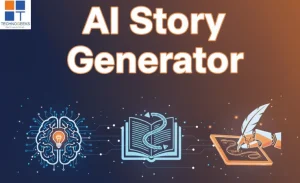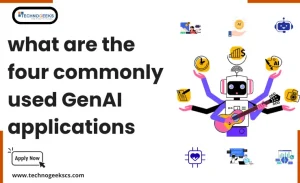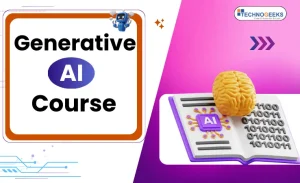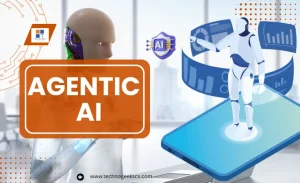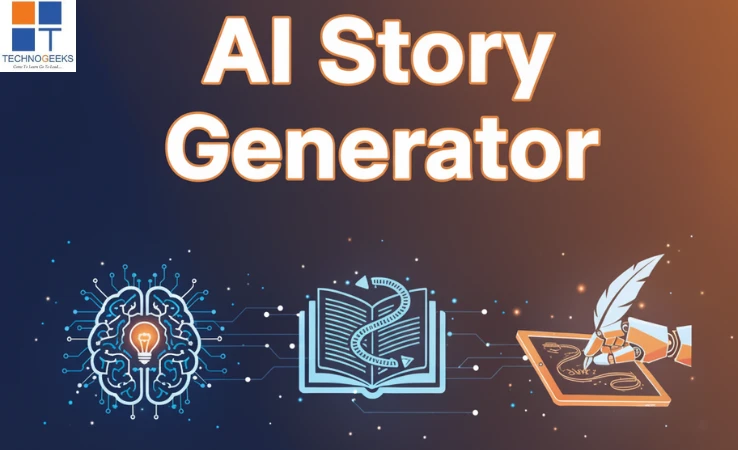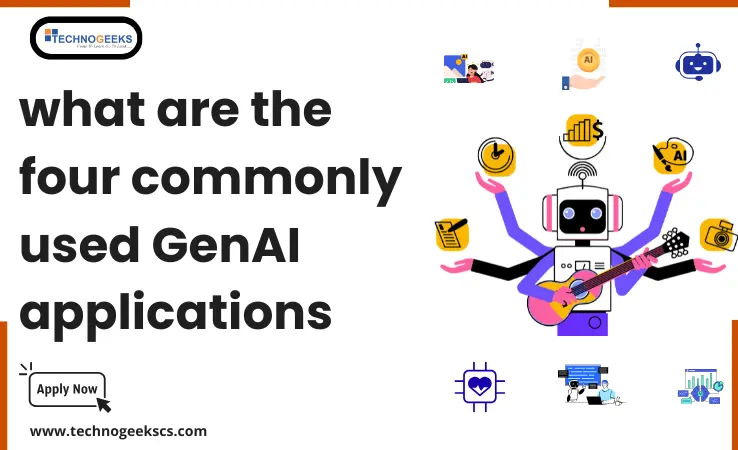Have you ever wondered what AI, AI full form – Artificial Intelligence, is all about? What are different types of Artificial Intelligence? and what will our future look like with AI? This concise introduction will go into the many types of Artificial Intelligence, as well as its possible future and influence on the world. Whether you’re a techie or simply intrigued about AI, this guide will provide you a strong foundation.
Table of Contents
ToggleWhat is Artificial Intelligence?
Artificial Intelligence (AI) is one of the humanity’s most remarkable & advanced technologies. It has the potential to transform not only the industries but also the whole of society and make many tasks easier & efficient!
Artificial Intelligence (AI) is basically the simulation of human intelligence in machines (software like ChatGPT) that are designed to think and act like humans. These intelligent systems or software can learn from data, make predictions, and take actions to achieve specific goals.
AI is a versatile technology that a number of growing fields and industries are applying. From image & speech recognition, to NLP [NLP full form:- natural language processing] and decision making, AI has the potential to greatly improve many aspects of our lives.
But, you know what, the field may be relatively uncharted. That means any great use of AI we see today is, in fact, just the tip of the AI iceberg. Experts have been talking about this constantly. But it’s still hard to understand how AI will affect society in the future!!
AI is a rapidly growing field with many exciting developments like ChatGPT, Dall-E 2, and many potential applications. Predicting how these AIs will impact society is a complicated subject. And there is growing concern and debate surrounding AI’s potential risks and challenges, particularly regarding developing advanced AI systems that could match or surpass human intelligence.
As for the impact of chatbots like ChatGPT, it has already created a buzz all over the internet with its multiple uses in coding, creative writing, etc. But do not worry!! These chatbots are limited in their capabilities and will not replace people interaction & decision making.
That being said, we should at least know the types of Artificial Intelligence. It will show us a clearer picture of what AI is capable of!
Learn Data Science with Python & Artificial Intelligence
Technogeeks offers a comprehensive data science training program in Pune and online, with 110 hours of interactive training led by IT professionals with 16+ years of experience. The course covers Data Visualization, Machine Learning, Deep Learning, NLP, AI, Data Analytics, and Python Programming. You’ll learn data visualization with Python libraries like Matplotlib and Seaborn, and data analysis with Numpy and Pandas.
What Type of Artificial Intelligence Are There (Four, Five, and more)?
The different Types of Artificial Intelligence are based on how well they can mimic human cognitive abilities.
So, based on how well a machine performs & how well it can adapt, we can divide AI into some classes.
A Type of Artificial Intelligence that can do more human-like tasks with the same level of ability to do tasks will be considered more advanced.
This system will consider an AI with restricted functionality and performance as a simpler (Weak AI) and less evolved type.
There are two general classifications for AI based on this criterion.
One way to classify AI and AI technologies is according to their similarities to human cognitive abilities and their ability to “think” and possibly “experience emotions” like individuals.
According to this classification, there are four major AI-based systems: reactive machines, limited memory machines, theory of mind, and self-aware AI.
Other Classifications are,
a) Artificial Narrow Intelligence (ANI)
b) Artificial General Intelligence (AGI)
c) Artificial Super Intelligence (ASI)
Reactive Machines
Reactive Machines, as the name suggests, act on simple inputs and outputs.
It is the most basic AI type in use and the first step in the AI system. This model of AI doesn’t store any input and can’t act based on machine learning models. And because of this, they can’t learn from actions or process past or future actions. They respond only to identical inputs.
Examples of Reactive Machines
- Spam filters used by the email services to keep promotional & phishing emails cluttering the inbox.
- Another example of it is recommendations systems used by the ecommerce websites like Amazon, Netflix to keep users engaged.
Limited Memory
One of the most used types of Artificial Intelligence is Limited memory, because of the vast historical data availability.
Limited memory AI builds experiential knowledge by observing actions or data, learning from the historical data.
This kind of AI combines pre-programmed information with historical and observational data to make predictions and carry out challenging classification tasks.
The most common and famous example of limited memory AI is autonomous vehicles like cars and trucks.
To drive autonomously on roads, autonomous vehicles use various sensors to make necessary adjustments.
To recognize the speed & driving patterns of other drivers, it uses limited memory to observe and stay on the road. IT makes these vehicles more secure while interpreting the continuous flow of sensor data.
There are three main categories of limited memory type AI,
➤Reinforcement learning
➤ Long Short Term Memory (LSTMs)
➤Evolutionary Generative Adversarial Networks (E-GAN)
Theory of Mind
If you’re not under a rock, then you certainly heard about the Google engineer’s claim about the AI acting itself and talking about its feelings to the engineer.
That’s what Theory of Mind is supposed to achieve, but we are a long way from this.
Other than taking commands by voice assistants like SIRI or Google, they can’t react to your emotional state.
Artificial Emotional Intelligence and decision-making are two fields of study that are trying to crack the theory of mind.
Self-Aware
Asimov’s Robot book series described how artificial intelligence could evolve into self-aware artificial intelligence.
Many movies describe this scenario where self-aware artificial intelligence can take over the world (Skynet in Terminator!!).
But all these scenarios fail to describe the technology that will create self-aware AI.
The development of ANNs (ANN full form:- Artificial Neural Networks), inspired by the human brain’s structure & function, has led to significant advancements in AI. However, we are still in the very beginning of AI era. Creating true Artificial General Intelligence (AGI) that is as intelligent as human intelligence still remains unreachable.
Currently, AI systems based on neural networks are still limited to specific tasks and cannot perform a wide range of intellectual tasks like a human. However, the progress in this area is exciting! It will be fascinating to see where AI take us!!
The AI community observes more than four categories of artificial intelligence. They have a close similarity but are documented based on applications, capabilities, and ways in which artificial intelligence abilities are applied.
They are as follows:
a) Artificial Narrow Intelligence (ANI)
b) Artificial General Intelligence (AGI)
c) Artificial Super Intelligence (ASI)
Future of Artificial Intelligence
Will we continue advancing AI and discovering new methods to enhance its capabilities to make it even smarter?
The future of Artificial Intelligence is very exciting! It is a rapidly evolving field with numerous possibilities. AI has the potential to transform a almost all the industries. It will also improve our daily lives in countless ways.
Some experts predict that AI will become increasingly integrated into our lives. It is already performing tasks such as driving cars, conducting medical diagnoses, and making more accurate financial predictions.
However, as AI continues to evolve, it raises important ethical & societal questions. For example, the increasing automation of jobs raises concerns about job displacement, while using AI in decision-making raises questions about accountability and bias. Ensuring the ethical & responsible use of AI will shape the future.
So, the future of AI holds great promise! But it will also require careful consideration and planning to ensure that its benefits are realized. also we’ll need to keep an eye on the potential risk AI will bring to us and itself!
Interested in learning how artificial intelligence works?
Checkout our Python with Data Science with AI course, you’ll learn how to get ready for a world driven by artificial intelligence.


